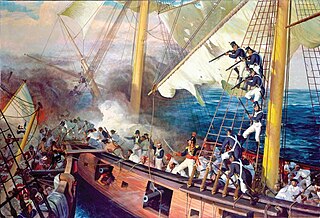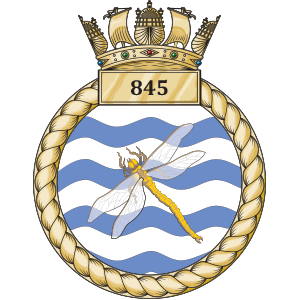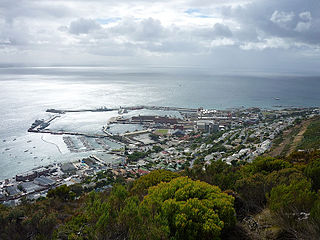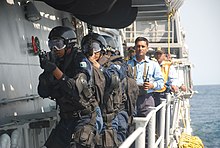
The South African Navy (SA Navy) is the naval warfare branch of the South African National Defence Force.

The United States Naval Special Warfare Command (USNSWC), also known as NAVSPECWARCOM and WARCOM, is the naval component of United States Special Operations Command, the unified command that oversees and conducts the nation's special operations and missions.

Marines are military personnel generally trained to operate on both land and sea, with a particular focus on amphibious warfare. Historically, the main tasks undertaken by marines have included raiding ashore and the boarding of vessels during ship-to-ship combat or capture of prize ships. Marines also assisted in maintaining security, discipline, and order aboard ships. While maintaining many of their historical roles, in modern times, marines also engage in duties including rapid-response operations, humanitarian aid, disaster relief, special operations roles, and counter-terrorism operations. In most nations, marines are an integral part of that state's navy, such as the United Kingdom's Royal Marines; in some countries their marine forces can also instead be part of the land army, such as the French Troupes de Marine; or, more uncommonly, a nation’s marine forces may be an independent military branch such as the United States Marine Corps or the Ukrainian Marine Corps.

1 South African Tank Regiment is an armoured regiment of the South African Army, based at the Tempe military base in Bloemfontein as part of the South African Army Armour Formation.

845 Naval Air Squadron is a squadron of the Royal Navy's Fleet Air Arm. Part of the Commando Helicopter Force, it is a specialist amphibious unit operating the AgustaWestland Commando Merlin HC4 helicopter and provides troop transport and load lifting support to the United Kingdom Commando Force and wider elements of the Royal Marines. In 2012, the squadron celebrated 50 years since it was awarded "commando" status.

The Navy Expeditionary Combat Command (NECC) is an echelon III command of the United States Navy, which serves as the single functional command to centrally manage current and future readiness, resources, manning, training and equipping of the United States Navy's 21,000 expeditionary forces who are currently serving in every theater of operation. The NECC was established in January 2006. NECC is a subordinate command of the Navy's Fleet Forces Command.
The structure of the United States Navy consists of four main bodies: the Office of the Secretary of the Navy, the Office of the Chief of Naval Operations, the operating forces, and the Shore Establishment.
The Operational Diving Division is part of the South African Navy's Maritime Reaction Squadron (MRS) that was formed as the Naval Rapid Deployment Force (NRDF) in 2006.

Lohatla is a training area of the South African National Defence Force. It is located in the Northern Cape province of South Africa and is home to the SA Army Combat Training Centre, which is part of the South African Army Training Formation.

South Africa currently does not have a marine corps, though in the past it did. It was originally set up as a sub-branch of the South African Navy during the apartheid era, with the primary purpose of protecting the country's harbours (1951-1955). Then it was recreated in 1979 during the South African Border War as 1 Marine Brigade with the aim of serving as marine infantry (1979-1990). Today, the SAN Maritime Reaction Squadron is the closest analogue to a marine corps South Africa has.

Marine expeditionary unit (special operations capable) (MEU(SOC)) is a program created by the United States Marine Corps (USMC) and the United States Navy (USN) in 1985 for Marine expeditionary units (MEU). The program enhances MEUs providing them with additional training and equipment to become certified as special operations capable with a Maritime Special Purpose Force (MSPF). The designation special operations capable is unique to the Marine Corps and means in relation to special operations. The role of a MEU(SOC) however is not equivalent to the special operations role of special operations forces. Although considered special operations capable a MEU(SOC) does not form part of the United States Special Operations Command (USSOCOM) established in 1987 or the United States Marine Forces Special Operations Command (MARSOC) later established in 2006.

The Naval Infantry Corps, also referred to as the Mexican Marines, are the naval infantry force of the Mexican Navy. The main task of the Infantería de Marina is to guarantee the maritime security of the country's ports and external and internal defense of the country. To accomplish these responsibilities, the corps is trained and equipped to take on any type of operations from sea, air and land. The Naval Infantry Corps is additionally responsible for Mexico's naval special operations forces (SOF), managing the Unidad de Operaciones Especiales, itself responsible for, among other units, the Fuerzas Especiales, the Mexican Navy's Tier 1 SOF unit.
The Fleet Command is responsible for the command, operations, readiness, training and force generation of all ships, submarines, aircraft squadrons, diving teams, and shore establishments of the Royal Australian Navy. Fleet Command is headquartered at HMAS Kuttabul in Sydney, and is led by the Commander Australian Fleet (COMAUSFLT), also referred to as Fleet Commander Australia (FCAUST), which is a rear admiral (two-star) appointment.

The MNDF Marine Corps are frontline ground combat force of the Maldives National Defence Force, formed in 2006. The Marine Corps were established at various strategic locations and vulnerable areas to enhance the force projection to provide their services throughout the country. It is a lethal and a mobile force, with a high physical strength and combat capability.

The Namibian Navy is the maritime warfare branch of the Namibian Defence Force.

The Joint Rapid Reaction Force (JRRF) was a capability concept of the British Armed Forces from 1999 to 2010. It was a pool of specialised units from all three armed services tasked with rapid deployment worldwide at short notice. The force was intended to be capable of mounting operations up to medium scale warfighting. It could be employed nationally, or multinationally under the auspices of NATO, the United Nations or any other coalition.

The Namibian Marines Corps are the marines of Namibia and is part of the Namibian Navy and the Namibian Defence Force.
Fleet Command is the South African Navy's single type command and controls all vessels and units of the South African Navy, besides Naval Headquarters. The commander of Fleet Command is a Rear Admiral and referred to as Flag Officer Fleet (FOF). The post was previously known as Chief of Naval Operations.
The Namibian Special Forces is a special operations command of the Namibian Defence Force responsible for special forces component commands army and marines. The command consists of Namibian Army Commando and Paratrooper, and the Namibian Marine Corps Amphibious Special Operations Unit. The Army Commando specialize in air assault and airborne operations, capture or kill high-value targets, counterterrorism, direct action, hostage rescue, insertion behind enemy lines, executive protection, and special warfare operations, while the Marine Corps Amphibious Special Operations Unit specialize in amphibious warfare, direct action, executive protection, insertion behind enemy lines, maritime counterterrorism and hostage rescue, naval boarding, naval special warfare operations, operating that originate from a river, ocean, swamp and delta, and underwater demolition. The army units receive training assistance from former South African Special Forces (Recces) and the marine corps from the Brazilian Marine Corps. The units regularly participate in Southern African Development Community (SADC) special forces exercises.














